Law Assignment: Knights Finance Ltd, ACL, and International Sales Law
VerifiedAdded on 2023/06/06
|6
|1822
|168
Homework Assignment
AI Summary
This law assignment addresses three key legal issues. The first part examines an employment contract dispute involving Knights Finance Ltd and Shulee, focusing on restraint of trade clauses and their enforceability under Australian law. The second part analyzes a product liability case where Mark’n’Mark Pit Masters Ltd (MMP) faces a claim related to a defective BBQ causing injury and property damage, considering defenses available under the Australian Consumer Law (ACL). Specifically, the assignment explores safety defects, manufacturer liability, and the application of ACL sections 138-142. The final part delves into an international sales contract between MMP and Tongy’s Developments, applying the United Nations Convention on Contracts for the International Sale of Goods (CISG) to determine the convention's applicability and scope, particularly regarding product liability issues. The assignment provides legal analysis, case references, and conclusions for each issue.
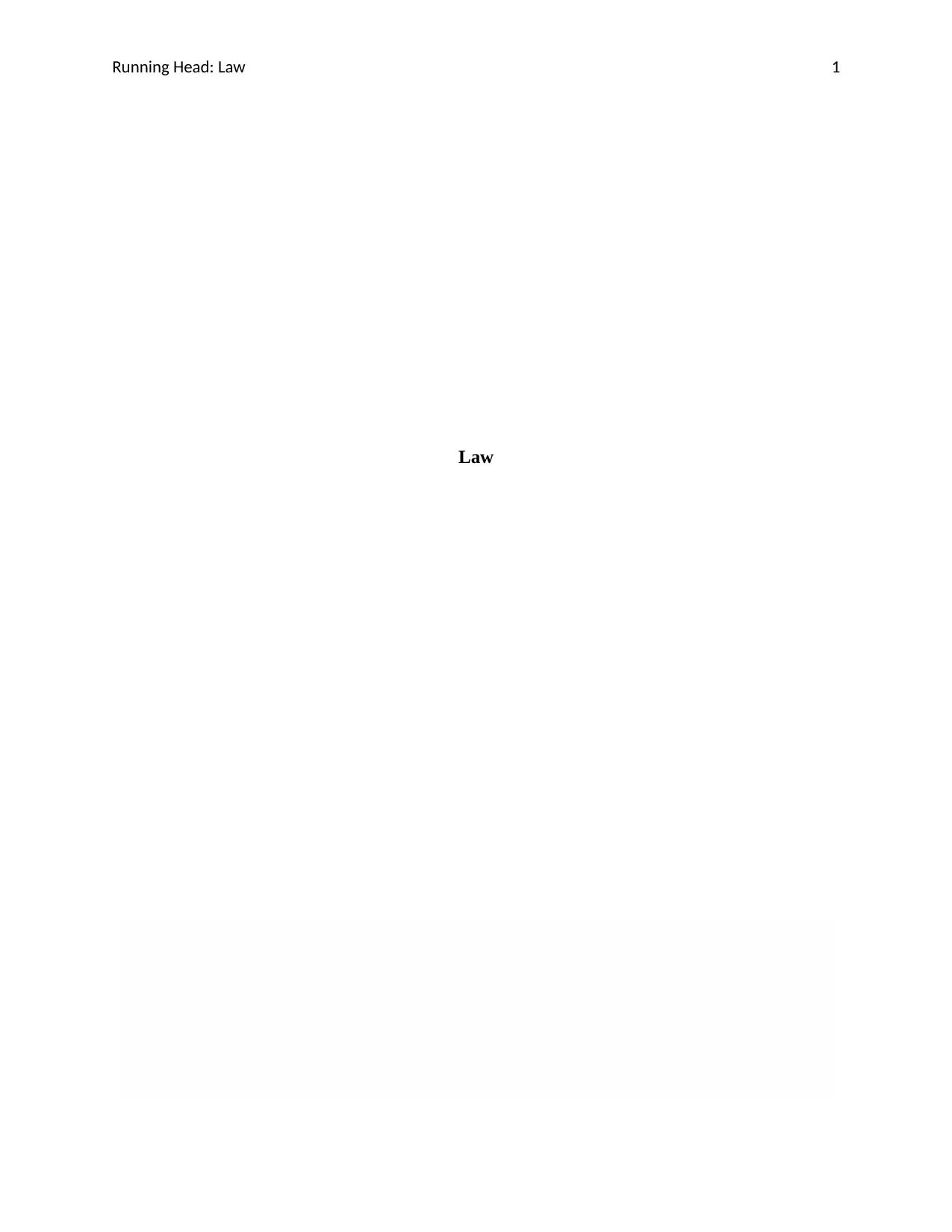
Running Head: Law 1
Law
Law
Paraphrase This Document
Need a fresh take? Get an instant paraphrase of this document with our AI Paraphraser
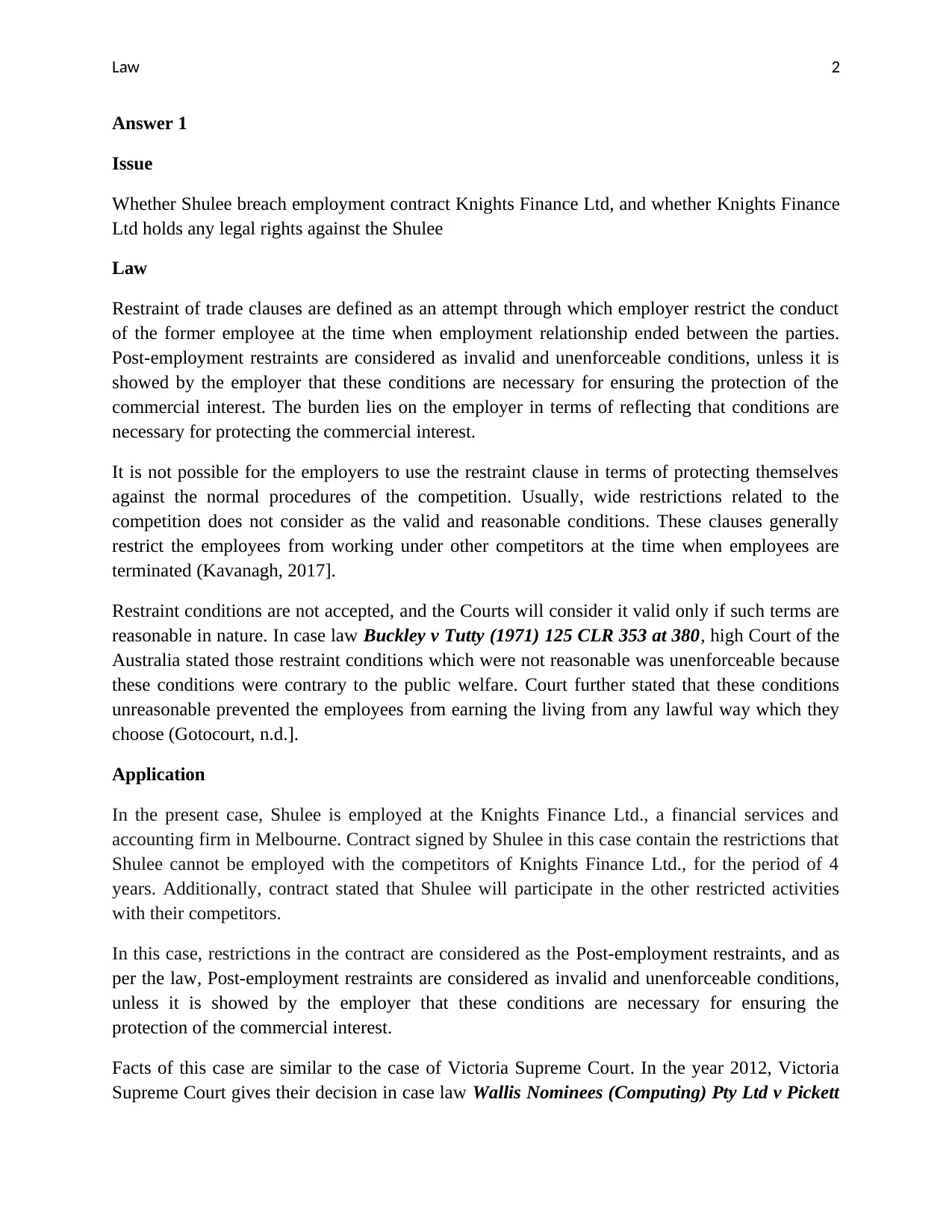
Law 2
Answer 1
Issue
Whether Shulee breach employment contract Knights Finance Ltd, and whether Knights Finance
Ltd holds any legal rights against the Shulee
Law
Restraint of trade clauses are defined as an attempt through which employer restrict the conduct
of the former employee at the time when employment relationship ended between the parties.
Post-employment restraints are considered as invalid and unenforceable conditions, unless it is
showed by the employer that these conditions are necessary for ensuring the protection of the
commercial interest. The burden lies on the employer in terms of reflecting that conditions are
necessary for protecting the commercial interest.
It is not possible for the employers to use the restraint clause in terms of protecting themselves
against the normal procedures of the competition. Usually, wide restrictions related to the
competition does not consider as the valid and reasonable conditions. These clauses generally
restrict the employees from working under other competitors at the time when employees are
terminated (Kavanagh, 2017].
Restraint conditions are not accepted, and the Courts will consider it valid only if such terms are
reasonable in nature. In case law Buckley v Tutty (1971) 125 CLR 353 at 380, high Court of the
Australia stated those restraint conditions which were not reasonable was unenforceable because
these conditions were contrary to the public welfare. Court further stated that these conditions
unreasonable prevented the employees from earning the living from any lawful way which they
choose (Gotocourt, n.d.].
Application
In the present case, Shulee is employed at the Knights Finance Ltd., a financial services and
accounting firm in Melbourne. Contract signed by Shulee in this case contain the restrictions that
Shulee cannot be employed with the competitors of Knights Finance Ltd., for the period of 4
years. Additionally, contract stated that Shulee will participate in the other restricted activities
with their competitors.
In this case, restrictions in the contract are considered as the Post-employment restraints, and as
per the law, Post-employment restraints are considered as invalid and unenforceable conditions,
unless it is showed by the employer that these conditions are necessary for ensuring the
protection of the commercial interest.
Facts of this case are similar to the case of Victoria Supreme Court. In the year 2012, Victoria
Supreme Court gives their decision in case law Wallis Nominees (Computing) Pty Ltd v Pickett
Answer 1
Issue
Whether Shulee breach employment contract Knights Finance Ltd, and whether Knights Finance
Ltd holds any legal rights against the Shulee
Law
Restraint of trade clauses are defined as an attempt through which employer restrict the conduct
of the former employee at the time when employment relationship ended between the parties.
Post-employment restraints are considered as invalid and unenforceable conditions, unless it is
showed by the employer that these conditions are necessary for ensuring the protection of the
commercial interest. The burden lies on the employer in terms of reflecting that conditions are
necessary for protecting the commercial interest.
It is not possible for the employers to use the restraint clause in terms of protecting themselves
against the normal procedures of the competition. Usually, wide restrictions related to the
competition does not consider as the valid and reasonable conditions. These clauses generally
restrict the employees from working under other competitors at the time when employees are
terminated (Kavanagh, 2017].
Restraint conditions are not accepted, and the Courts will consider it valid only if such terms are
reasonable in nature. In case law Buckley v Tutty (1971) 125 CLR 353 at 380, high Court of the
Australia stated those restraint conditions which were not reasonable was unenforceable because
these conditions were contrary to the public welfare. Court further stated that these conditions
unreasonable prevented the employees from earning the living from any lawful way which they
choose (Gotocourt, n.d.].
Application
In the present case, Shulee is employed at the Knights Finance Ltd., a financial services and
accounting firm in Melbourne. Contract signed by Shulee in this case contain the restrictions that
Shulee cannot be employed with the competitors of Knights Finance Ltd., for the period of 4
years. Additionally, contract stated that Shulee will participate in the other restricted activities
with their competitors.
In this case, restrictions in the contract are considered as the Post-employment restraints, and as
per the law, Post-employment restraints are considered as invalid and unenforceable conditions,
unless it is showed by the employer that these conditions are necessary for ensuring the
protection of the commercial interest.
Facts of this case are similar to the case of Victoria Supreme Court. In the year 2012, Victoria
Supreme Court gives their decision in case law Wallis Nominees (Computing) Pty Ltd v Pickett
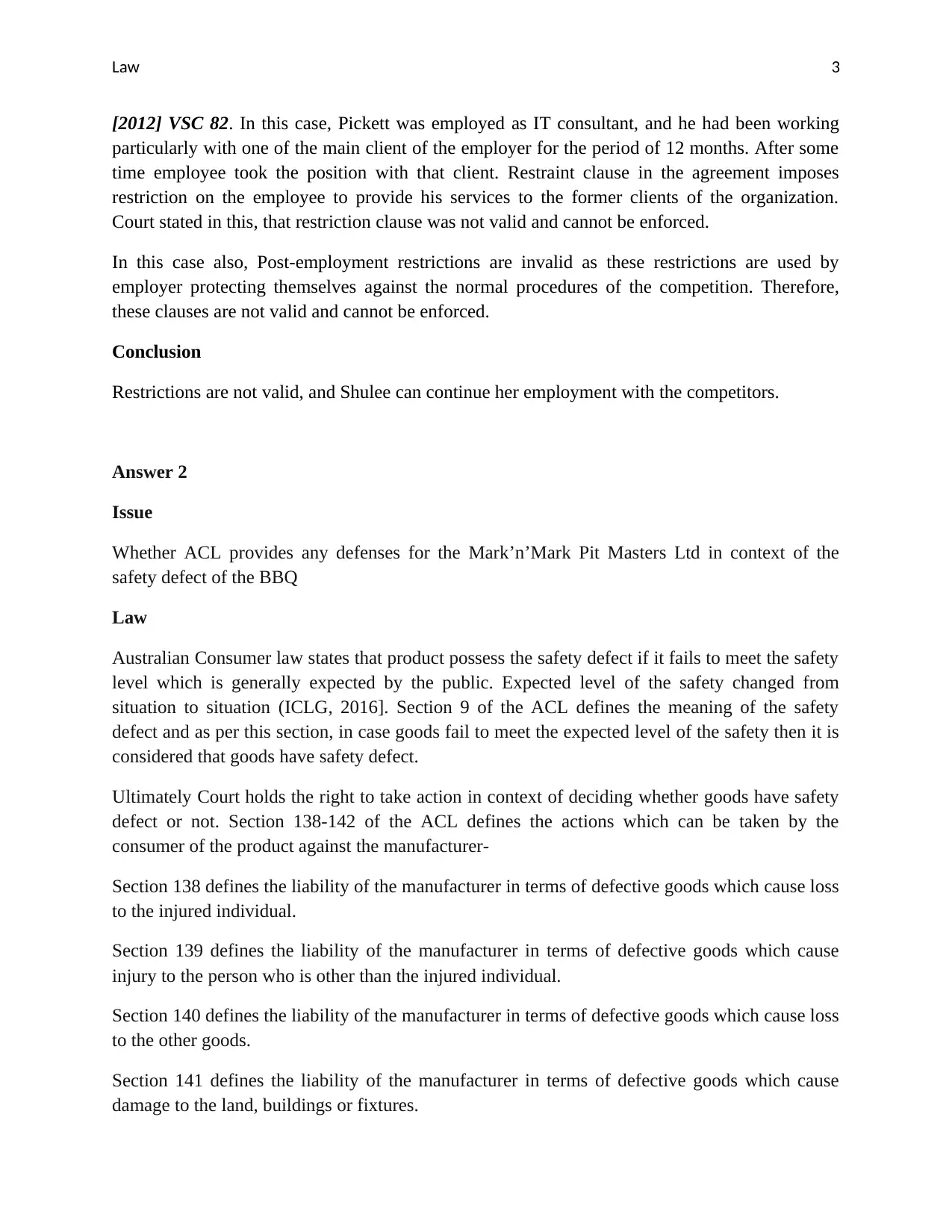
Law 3
[2012] VSC 82. In this case, Pickett was employed as IT consultant, and he had been working
particularly with one of the main client of the employer for the period of 12 months. After some
time employee took the position with that client. Restraint clause in the agreement imposes
restriction on the employee to provide his services to the former clients of the organization.
Court stated in this, that restriction clause was not valid and cannot be enforced.
In this case also, Post-employment restrictions are invalid as these restrictions are used by
employer protecting themselves against the normal procedures of the competition. Therefore,
these clauses are not valid and cannot be enforced.
Conclusion
Restrictions are not valid, and Shulee can continue her employment with the competitors.
Answer 2
Issue
Whether ACL provides any defenses for the Mark’n’Mark Pit Masters Ltd in context of the
safety defect of the BBQ
Law
Australian Consumer law states that product possess the safety defect if it fails to meet the safety
level which is generally expected by the public. Expected level of the safety changed from
situation to situation (ICLG, 2016]. Section 9 of the ACL defines the meaning of the safety
defect and as per this section, in case goods fail to meet the expected level of the safety then it is
considered that goods have safety defect.
Ultimately Court holds the right to take action in context of deciding whether goods have safety
defect or not. Section 138-142 of the ACL defines the actions which can be taken by the
consumer of the product against the manufacturer-
Section 138 defines the liability of the manufacturer in terms of defective goods which cause loss
to the injured individual.
Section 139 defines the liability of the manufacturer in terms of defective goods which cause
injury to the person who is other than the injured individual.
Section 140 defines the liability of the manufacturer in terms of defective goods which cause loss
to the other goods.
Section 141 defines the liability of the manufacturer in terms of defective goods which cause
damage to the land, buildings or fixtures.
[2012] VSC 82. In this case, Pickett was employed as IT consultant, and he had been working
particularly with one of the main client of the employer for the period of 12 months. After some
time employee took the position with that client. Restraint clause in the agreement imposes
restriction on the employee to provide his services to the former clients of the organization.
Court stated in this, that restriction clause was not valid and cannot be enforced.
In this case also, Post-employment restrictions are invalid as these restrictions are used by
employer protecting themselves against the normal procedures of the competition. Therefore,
these clauses are not valid and cannot be enforced.
Conclusion
Restrictions are not valid, and Shulee can continue her employment with the competitors.
Answer 2
Issue
Whether ACL provides any defenses for the Mark’n’Mark Pit Masters Ltd in context of the
safety defect of the BBQ
Law
Australian Consumer law states that product possess the safety defect if it fails to meet the safety
level which is generally expected by the public. Expected level of the safety changed from
situation to situation (ICLG, 2016]. Section 9 of the ACL defines the meaning of the safety
defect and as per this section, in case goods fail to meet the expected level of the safety then it is
considered that goods have safety defect.
Ultimately Court holds the right to take action in context of deciding whether goods have safety
defect or not. Section 138-142 of the ACL defines the actions which can be taken by the
consumer of the product against the manufacturer-
Section 138 defines the liability of the manufacturer in terms of defective goods which cause loss
to the injured individual.
Section 139 defines the liability of the manufacturer in terms of defective goods which cause
injury to the person who is other than the injured individual.
Section 140 defines the liability of the manufacturer in terms of defective goods which cause loss
to the other goods.
Section 141 defines the liability of the manufacturer in terms of defective goods which cause
damage to the land, buildings or fixtures.
⊘ This is a preview!⊘
Do you want full access?
Subscribe today to unlock all pages.

Trusted by 1+ million students worldwide
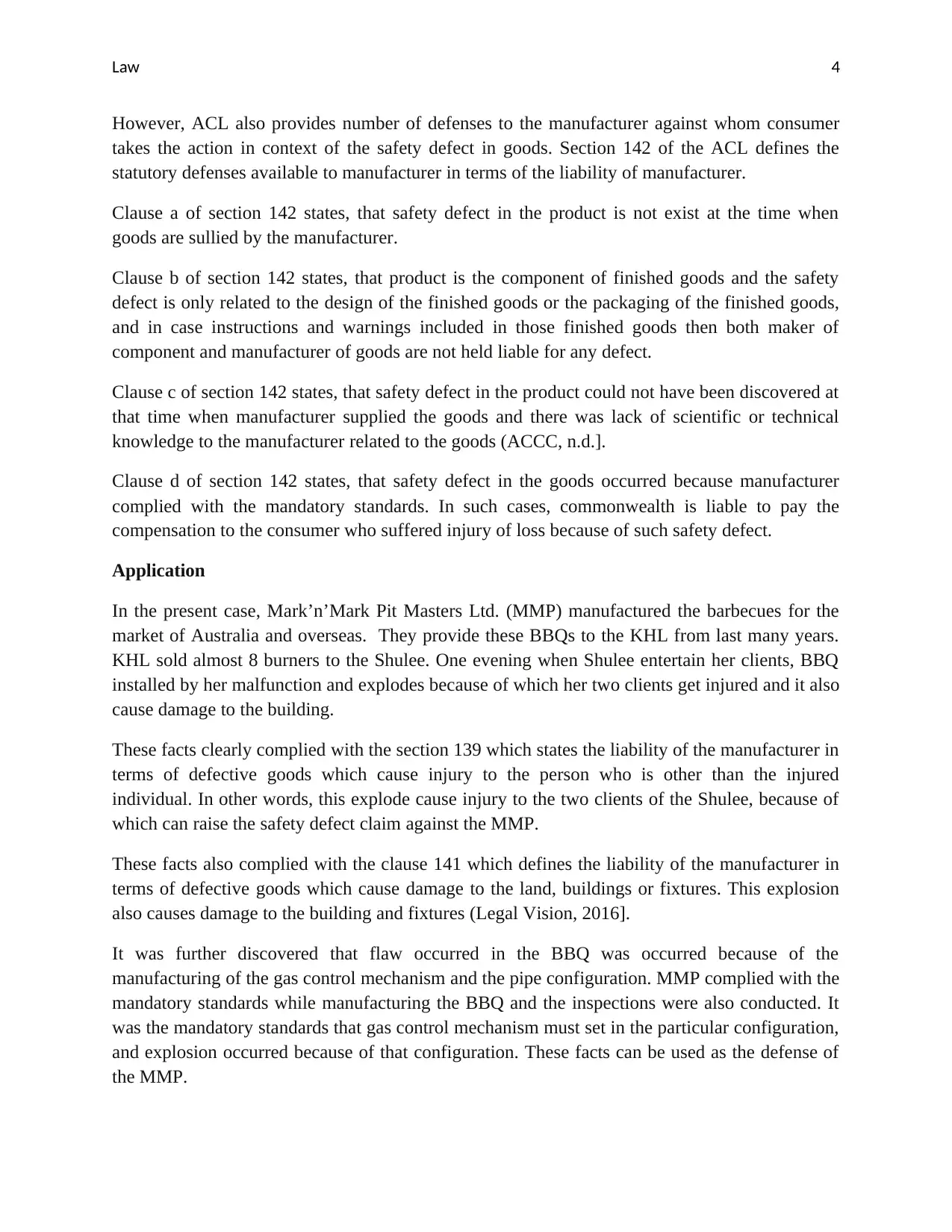
Law 4
However, ACL also provides number of defenses to the manufacturer against whom consumer
takes the action in context of the safety defect in goods. Section 142 of the ACL defines the
statutory defenses available to manufacturer in terms of the liability of manufacturer.
Clause a of section 142 states, that safety defect in the product is not exist at the time when
goods are sullied by the manufacturer.
Clause b of section 142 states, that product is the component of finished goods and the safety
defect is only related to the design of the finished goods or the packaging of the finished goods,
and in case instructions and warnings included in those finished goods then both maker of
component and manufacturer of goods are not held liable for any defect.
Clause c of section 142 states, that safety defect in the product could not have been discovered at
that time when manufacturer supplied the goods and there was lack of scientific or technical
knowledge to the manufacturer related to the goods (ACCC, n.d.].
Clause d of section 142 states, that safety defect in the goods occurred because manufacturer
complied with the mandatory standards. In such cases, commonwealth is liable to pay the
compensation to the consumer who suffered injury of loss because of such safety defect.
Application
In the present case, Mark’n’Mark Pit Masters Ltd. (MMP) manufactured the barbecues for the
market of Australia and overseas. They provide these BBQs to the KHL from last many years.
KHL sold almost 8 burners to the Shulee. One evening when Shulee entertain her clients, BBQ
installed by her malfunction and explodes because of which her two clients get injured and it also
cause damage to the building.
These facts clearly complied with the section 139 which states the liability of the manufacturer in
terms of defective goods which cause injury to the person who is other than the injured
individual. In other words, this explode cause injury to the two clients of the Shulee, because of
which can raise the safety defect claim against the MMP.
These facts also complied with the clause 141 which defines the liability of the manufacturer in
terms of defective goods which cause damage to the land, buildings or fixtures. This explosion
also causes damage to the building and fixtures (Legal Vision, 2016].
It was further discovered that flaw occurred in the BBQ was occurred because of the
manufacturing of the gas control mechanism and the pipe configuration. MMP complied with the
mandatory standards while manufacturing the BBQ and the inspections were also conducted. It
was the mandatory standards that gas control mechanism must set in the particular configuration,
and explosion occurred because of that configuration. These facts can be used as the defense of
the MMP.
However, ACL also provides number of defenses to the manufacturer against whom consumer
takes the action in context of the safety defect in goods. Section 142 of the ACL defines the
statutory defenses available to manufacturer in terms of the liability of manufacturer.
Clause a of section 142 states, that safety defect in the product is not exist at the time when
goods are sullied by the manufacturer.
Clause b of section 142 states, that product is the component of finished goods and the safety
defect is only related to the design of the finished goods or the packaging of the finished goods,
and in case instructions and warnings included in those finished goods then both maker of
component and manufacturer of goods are not held liable for any defect.
Clause c of section 142 states, that safety defect in the product could not have been discovered at
that time when manufacturer supplied the goods and there was lack of scientific or technical
knowledge to the manufacturer related to the goods (ACCC, n.d.].
Clause d of section 142 states, that safety defect in the goods occurred because manufacturer
complied with the mandatory standards. In such cases, commonwealth is liable to pay the
compensation to the consumer who suffered injury of loss because of such safety defect.
Application
In the present case, Mark’n’Mark Pit Masters Ltd. (MMP) manufactured the barbecues for the
market of Australia and overseas. They provide these BBQs to the KHL from last many years.
KHL sold almost 8 burners to the Shulee. One evening when Shulee entertain her clients, BBQ
installed by her malfunction and explodes because of which her two clients get injured and it also
cause damage to the building.
These facts clearly complied with the section 139 which states the liability of the manufacturer in
terms of defective goods which cause injury to the person who is other than the injured
individual. In other words, this explode cause injury to the two clients of the Shulee, because of
which can raise the safety defect claim against the MMP.
These facts also complied with the clause 141 which defines the liability of the manufacturer in
terms of defective goods which cause damage to the land, buildings or fixtures. This explosion
also causes damage to the building and fixtures (Legal Vision, 2016].
It was further discovered that flaw occurred in the BBQ was occurred because of the
manufacturing of the gas control mechanism and the pipe configuration. MMP complied with the
mandatory standards while manufacturing the BBQ and the inspections were also conducted. It
was the mandatory standards that gas control mechanism must set in the particular configuration,
and explosion occurred because of that configuration. These facts can be used as the defense of
the MMP.
Paraphrase This Document
Need a fresh take? Get an instant paraphrase of this document with our AI Paraphraser
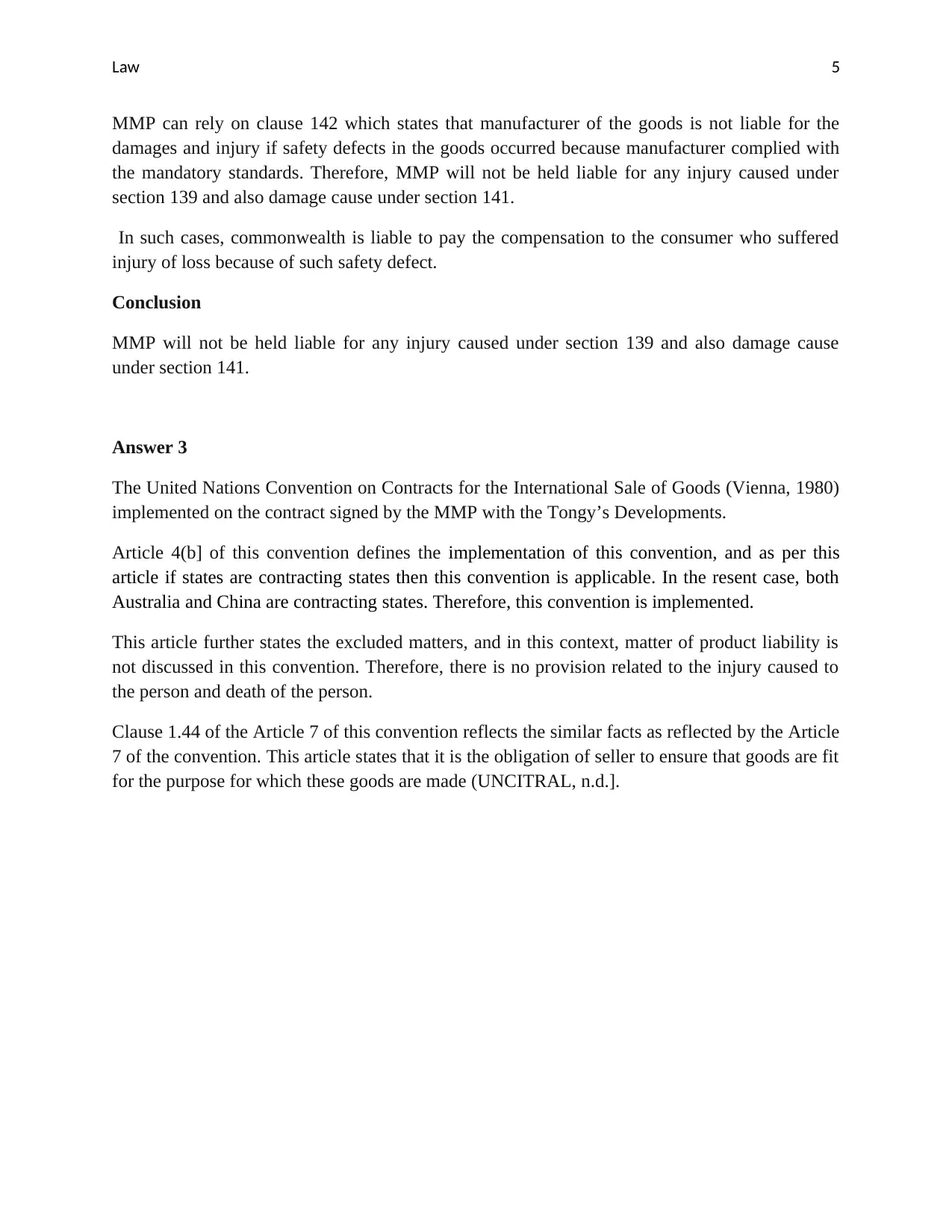
Law 5
MMP can rely on clause 142 which states that manufacturer of the goods is not liable for the
damages and injury if safety defects in the goods occurred because manufacturer complied with
the mandatory standards. Therefore, MMP will not be held liable for any injury caused under
section 139 and also damage cause under section 141.
In such cases, commonwealth is liable to pay the compensation to the consumer who suffered
injury of loss because of such safety defect.
Conclusion
MMP will not be held liable for any injury caused under section 139 and also damage cause
under section 141.
Answer 3
The United Nations Convention on Contracts for the International Sale of Goods (Vienna, 1980)
implemented on the contract signed by the MMP with the Tongy’s Developments.
Article 4(b] of this convention defines the implementation of this convention, and as per this
article if states are contracting states then this convention is applicable. In the resent case, both
Australia and China are contracting states. Therefore, this convention is implemented.
This article further states the excluded matters, and in this context, matter of product liability is
not discussed in this convention. Therefore, there is no provision related to the injury caused to
the person and death of the person.
Clause 1.44 of the Article 7 of this convention reflects the similar facts as reflected by the Article
7 of the convention. This article states that it is the obligation of seller to ensure that goods are fit
for the purpose for which these goods are made (UNCITRAL, n.d.].
MMP can rely on clause 142 which states that manufacturer of the goods is not liable for the
damages and injury if safety defects in the goods occurred because manufacturer complied with
the mandatory standards. Therefore, MMP will not be held liable for any injury caused under
section 139 and also damage cause under section 141.
In such cases, commonwealth is liable to pay the compensation to the consumer who suffered
injury of loss because of such safety defect.
Conclusion
MMP will not be held liable for any injury caused under section 139 and also damage cause
under section 141.
Answer 3
The United Nations Convention on Contracts for the International Sale of Goods (Vienna, 1980)
implemented on the contract signed by the MMP with the Tongy’s Developments.
Article 4(b] of this convention defines the implementation of this convention, and as per this
article if states are contracting states then this convention is applicable. In the resent case, both
Australia and China are contracting states. Therefore, this convention is implemented.
This article further states the excluded matters, and in this context, matter of product liability is
not discussed in this convention. Therefore, there is no provision related to the injury caused to
the person and death of the person.
Clause 1.44 of the Article 7 of this convention reflects the similar facts as reflected by the Article
7 of the convention. This article states that it is the obligation of seller to ensure that goods are fit
for the purpose for which these goods are made (UNCITRAL, n.d.].
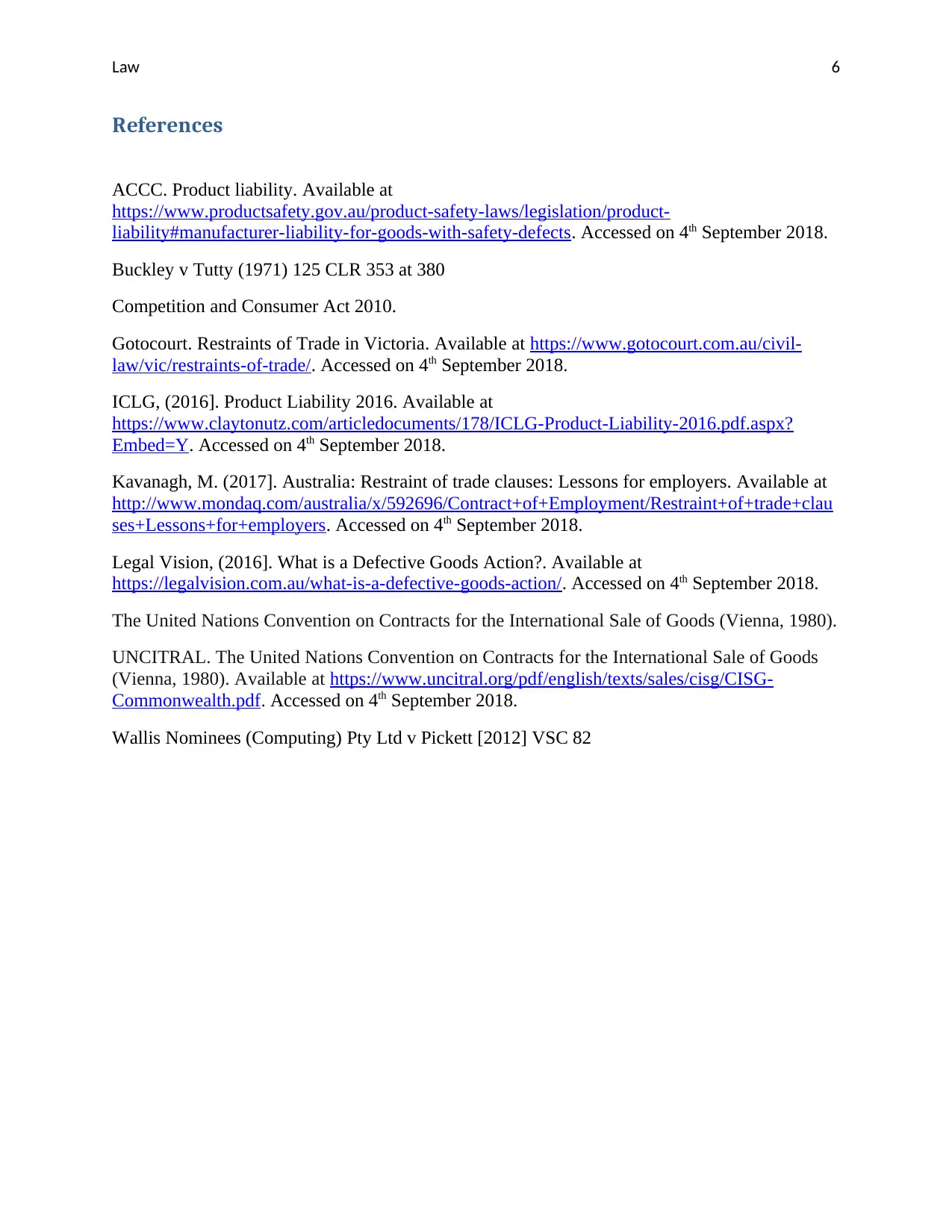
Law 6
References
ACCC. Product liability. Available at
https://www.productsafety.gov.au/product-safety-laws/legislation/product-
liability#manufacturer-liability-for-goods-with-safety-defects. Accessed on 4th September 2018.
Buckley v Tutty (1971) 125 CLR 353 at 380
Competition and Consumer Act 2010.
Gotocourt. Restraints of Trade in Victoria. Available at https://www.gotocourt.com.au/civil-
law/vic/restraints-of-trade/. Accessed on 4th September 2018.
ICLG, (2016]. Product Liability 2016. Available at
https://www.claytonutz.com/articledocuments/178/ICLG-Product-Liability-2016.pdf.aspx?
Embed=Y. Accessed on 4th September 2018.
Kavanagh, M. (2017]. Australia: Restraint of trade clauses: Lessons for employers. Available at
http://www.mondaq.com/australia/x/592696/Contract+of+Employment/Restraint+of+trade+clau
ses+Lessons+for+employers. Accessed on 4th September 2018.
Legal Vision, (2016]. What is a Defective Goods Action?. Available at
https://legalvision.com.au/what-is-a-defective-goods-action/. Accessed on 4th September 2018.
The United Nations Convention on Contracts for the International Sale of Goods (Vienna, 1980).
UNCITRAL. The United Nations Convention on Contracts for the International Sale of Goods
(Vienna, 1980). Available at https://www.uncitral.org/pdf/english/texts/sales/cisg/CISG-
Commonwealth.pdf. Accessed on 4th September 2018.
Wallis Nominees (Computing) Pty Ltd v Pickett [2012] VSC 82
References
ACCC. Product liability. Available at
https://www.productsafety.gov.au/product-safety-laws/legislation/product-
liability#manufacturer-liability-for-goods-with-safety-defects. Accessed on 4th September 2018.
Buckley v Tutty (1971) 125 CLR 353 at 380
Competition and Consumer Act 2010.
Gotocourt. Restraints of Trade in Victoria. Available at https://www.gotocourt.com.au/civil-
law/vic/restraints-of-trade/. Accessed on 4th September 2018.
ICLG, (2016]. Product Liability 2016. Available at
https://www.claytonutz.com/articledocuments/178/ICLG-Product-Liability-2016.pdf.aspx?
Embed=Y. Accessed on 4th September 2018.
Kavanagh, M. (2017]. Australia: Restraint of trade clauses: Lessons for employers. Available at
http://www.mondaq.com/australia/x/592696/Contract+of+Employment/Restraint+of+trade+clau
ses+Lessons+for+employers. Accessed on 4th September 2018.
Legal Vision, (2016]. What is a Defective Goods Action?. Available at
https://legalvision.com.au/what-is-a-defective-goods-action/. Accessed on 4th September 2018.
The United Nations Convention on Contracts for the International Sale of Goods (Vienna, 1980).
UNCITRAL. The United Nations Convention on Contracts for the International Sale of Goods
(Vienna, 1980). Available at https://www.uncitral.org/pdf/english/texts/sales/cisg/CISG-
Commonwealth.pdf. Accessed on 4th September 2018.
Wallis Nominees (Computing) Pty Ltd v Pickett [2012] VSC 82
⊘ This is a preview!⊘
Do you want full access?
Subscribe today to unlock all pages.

Trusted by 1+ million students worldwide
1 out of 6
Related Documents
Your All-in-One AI-Powered Toolkit for Academic Success.
+13062052269
info@desklib.com
Available 24*7 on WhatsApp / Email
![[object Object]](/_next/static/media/star-bottom.7253800d.svg)
Unlock your academic potential
Copyright © 2020–2026 A2Z Services. All Rights Reserved. Developed and managed by ZUCOL.





